If you want to experience a prime sampling of a city’s culinary offerings without putting serious miles on your engine (or your feet) from traipsing from neighborhood to neighborhood, the food hall provides maximum efficiency without sacrificing flavor and overall dining quality. And while food halls have been a consistent presence in American metropolises for decades, the last five years have witnessed an impressive rise in this food-service model, with new and inventive markets specializing in international bites and regional favorites popping up in U.S. cities both large and small. In this list, you’ll find 10 American food halls with enough excellent eats, attractive environs, and city-specific vibes to make them well worth a flight or a road trip.
Chelsea Market
New York, New York
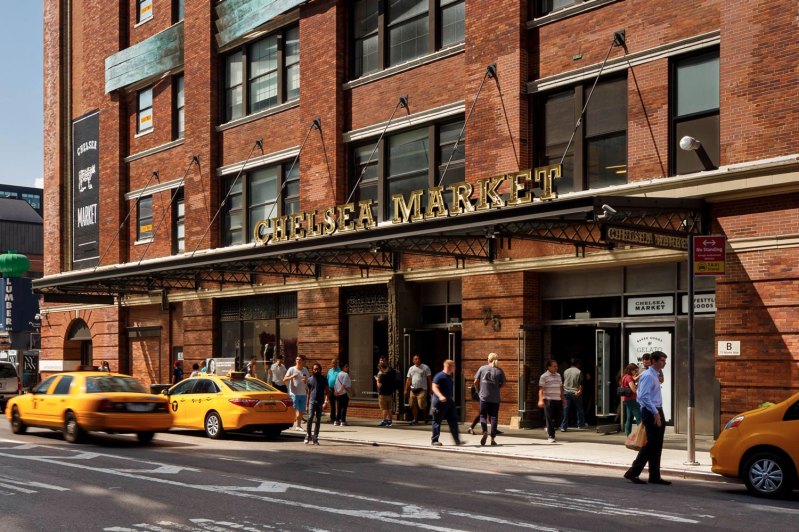
The Big Apple is a veritable hotbed of upscale food halls nowadays, with high-profile versions opening in luxury buildings on the far west side of Manhattan, in quickly gentrifying downtown Brooklyn, and everywhere in between. But in 1997, long before this influx of posh indoor food markets, Chelsea Market arguably pioneered the concept, bringing an array of vendors and eateries together for a community-inspired, laid-back shopping and dining experience. Today, Chelsea Market continues to stand on the forefront of food-hall innovations, providing visitors with everything from an Italian grocer offering housemade pastas and imported ingredients (Buon’Italia) to an impressive kitchen-supplies retailer (Bowery Kitchens) to a lauded street taqueria (Los Tacos No. 1) to a chic but accessible wine bar (Corkbuzz).
Union Market
Washington, D.C.
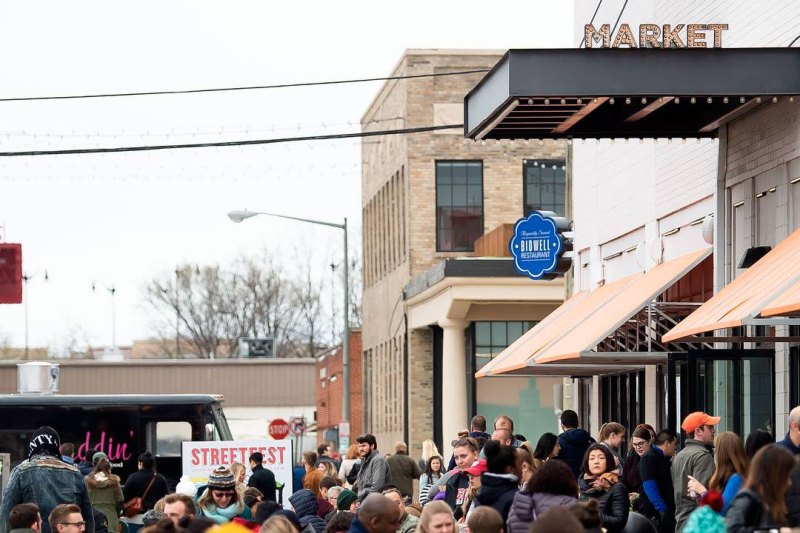
A D.C. concept dating back over a century, Union Market features a lively blend of grab-and-go spots, refined but casual sit-down restaurants, single-origin coffees, and boozy libations provided by local distillers and brewers. The enormous industrial-style space includes numerous seating sections (both indoors and outdoors) for visitors to relax and enjoy eats from popular vendors like District Doughnut, DC Dosa, and Tickling Springs Creamery. Union Market also hosts temporary pop-ups on a regular basis, adding some novelty to the experiences of even their most regular clientele.
Workshop
Charleston, South Carolina
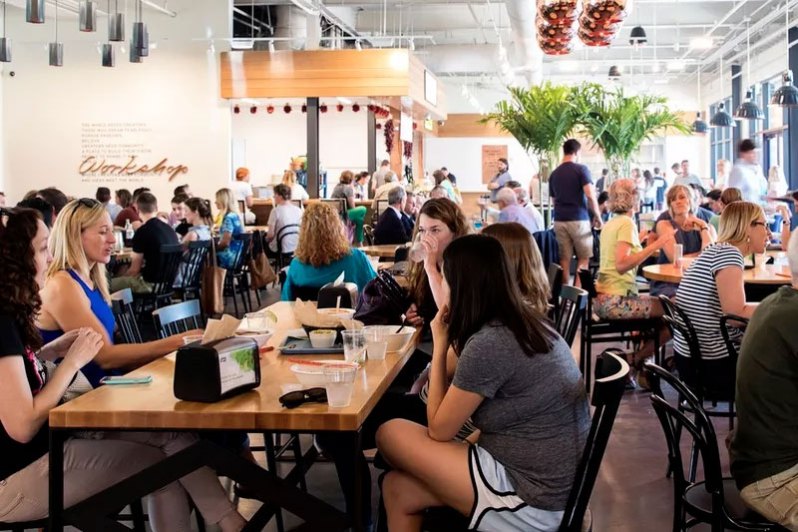
If you’re looking for an ever-changing food market with a focus on creative up-and-comers, then Workshop in the foodie haven of Charleston may be an ideal venue for you. Workshop refers to itself as an “exploratory food court.” giving aspiring local restauranteurs and vendors the opportunity to sell their wares in limited engagements, engaging in total overhauls on a regular basis. The space contains six “restaurant” stations occupied by rotating vendors, and the Charleston dining community is encouraged to share their thoughts on Workshop’s current food offerings and to provide suggestions for future residencies. The result? A collaborative, free-spirited dining adventure that’s wholly unpredictable and never dull.
Cultivation Food Hall
Jackson, Mississippi
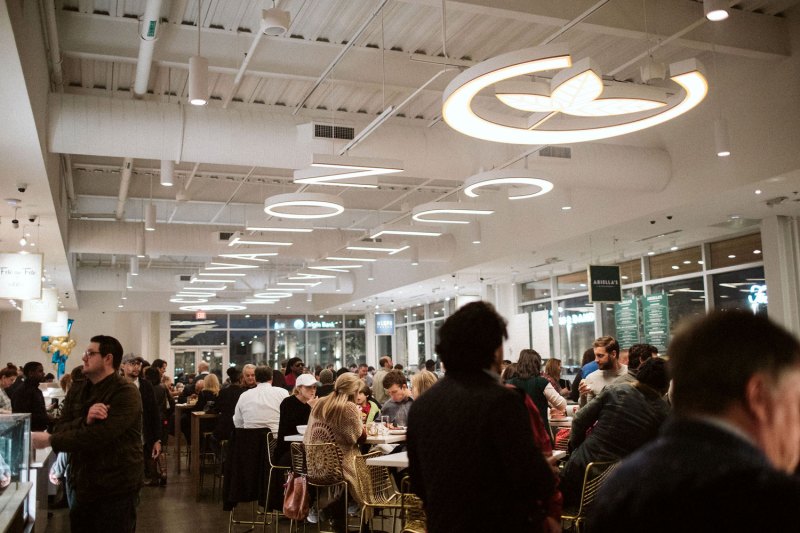
The first establishment of its kind in the state of Mississippi, Jackson’s Cultivation Food Hall seeks to “showcase a carefully curated collection of boutique restaurant concepts, specialty coffees, and classic, craft cocktails.” The windowed warehouse building includes stations helmed by local chefs like Gold Coast (serving the riverfront cuisine that defines this area of Mississippi), Poké Stop (serving Hawaiian poké bowls), Bocca Pizzeria, and Local Honey (a nutritious concept with salads, bowls, and toasts made from locally sourced ingredients).
St. Roch Market
New Orleans, Lousiana
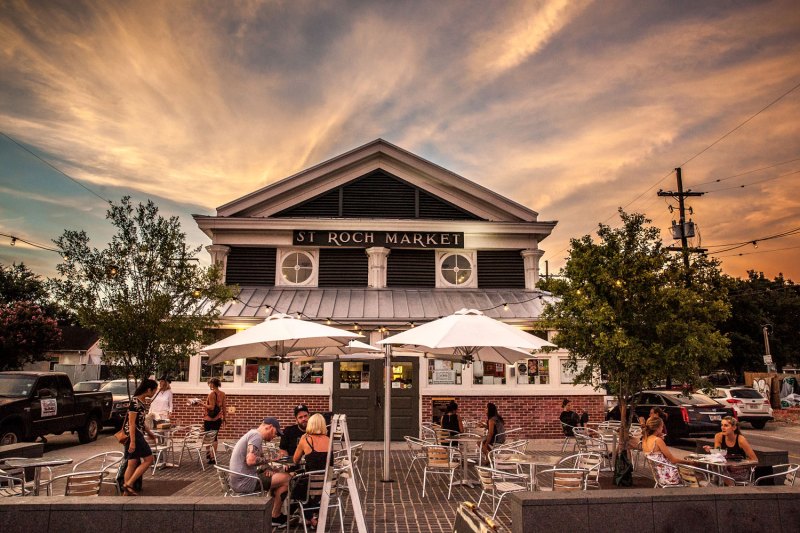
A city as universally acclaimed for its cuisine as New Orleans deserves some representation in the food hall pantheon … and, in 2015, NOLA finally got a food hall worthy of its culinary prestige in the St. Roch Market. Located in a 19th-century market building adjacent to the mega-hip Marigny neighborhood, St. Roch Market highlights regional Louisiana fare with a global twist, all created by local chefs and bartenders. Vendors include Coast Roast Coffee (a great spot to grab a cup of chicory-laced New Orleans coffee), Elysian Seafood (highlighting the legendary Gulf oyster), Laksa (specializing in flavorful comfort eats from Southeast Asia), and Fritai (focusing on Haitian soul food).
Legacy Food Hall
Plano, Texas
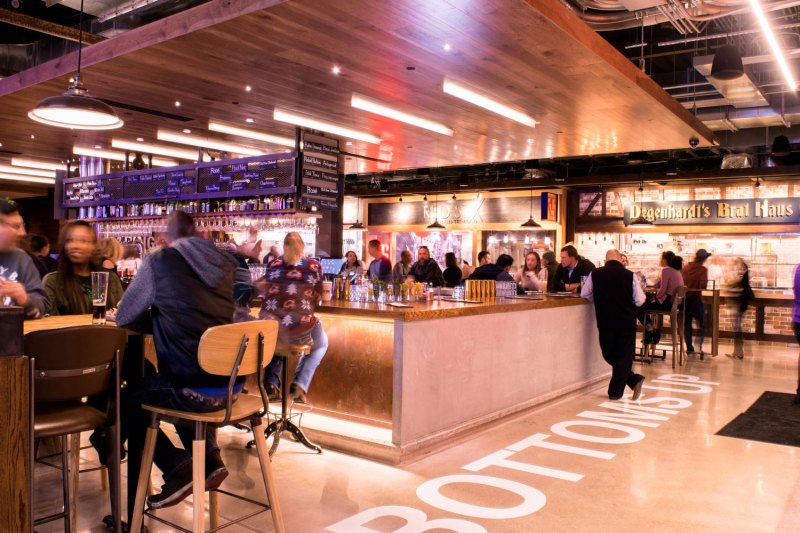
When we think of Texan cuisine, barbecue and tacos frequently jump to the forefront of our minds. At Legacy Food Hall in Plano, you’ll find excellent examples of both, plus an eclectic blend of cuisines from all over the state and all over the world. This massive building contains an on-site brewery, an outdoor beer garden, a live-music venue, and over 20 vendor stalls like Beijing Brothers (Chinese-inspired street food), Bravazo Rotisserie (Peruvian rotisserie chicken), Carlton Provisions (classic Texan barbecue), Degenhardt’s Brat Haus (German sausages with all the fixings), and Tacos Patron (Mexico City-style tacos).
Sawmill Market
Albuquerque, New Mexico
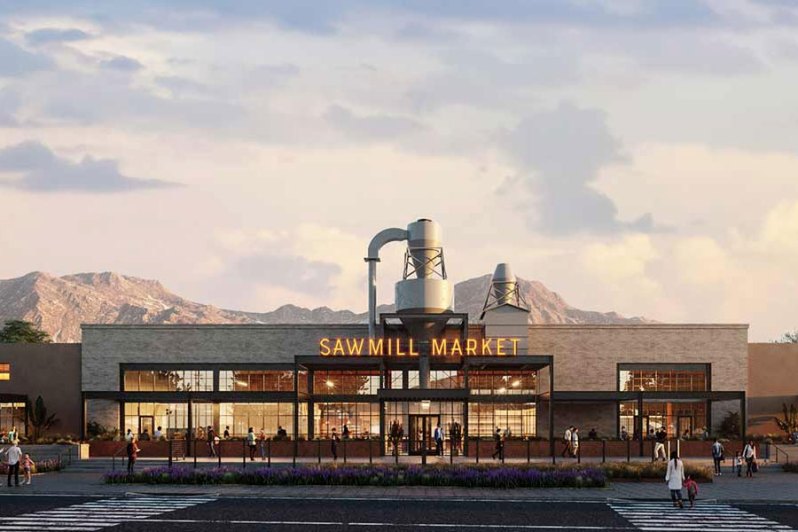
And now, for something so new that it hasn’t even officially opened yet: Sawmill Market, which calls itself “New Mexico’s first food hall.” This Albuquerque establishment hopes to introduce ABQ chefs, farmers, and artisans to a wider audience by showcasing their work within a huge former lumber warehouse in the Sawmill District. Currently on the list of confirmed vendors are Naruto Ramen (a ramen restaurant founded by the first family to bring Japanese cuisine to New Mexico), Mr. Powdrell’s Barbecue (a smoke joint founded by an Albuquerque barbecue family by way of Louisiana), and Mercantile Cafe & Wine (an all-day cafe featuring local produce and global wines). Sawmill Market anticipates an official opening in February 2020.
Pike Place Market
Seattle, Washington
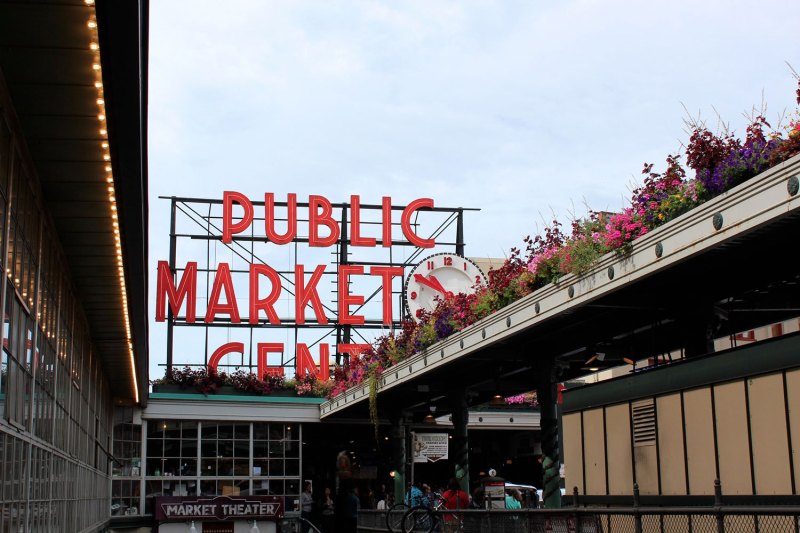
Easily one of the largest food centers in the United States, Pike Place Market in Seattle gives equal emphasis to the “market” aspect as it does to the “restaurant and food stand” side of the equation. The Pike Place Market Historic District encompasses nine acres, with its location clearly marked by the iconic “Public Market Center” neon sign positioned between the market and the waterfront. The farmer’s market offers impeccable in-season produce to Seattle shoppers, the fish market is among the most highly celebrated in the country, and the craft market features goods by local artisans ranging from jewelry to pottery to leather goods to organic skincare products. Those in search of a full restaurant meal can enjoy the menus at any of Pike Place Market’s 30-plus eateries, like the Athenian Restaurant and Bar (classic seafood spot serving Pike Place Market guests since the early 1900s), Le Pichet (charming and date-worthy French bistro), and Oriental Market (grocer/buffet with authentic home-style Filipino fare).
Grand Central Market
Los Angeles, California
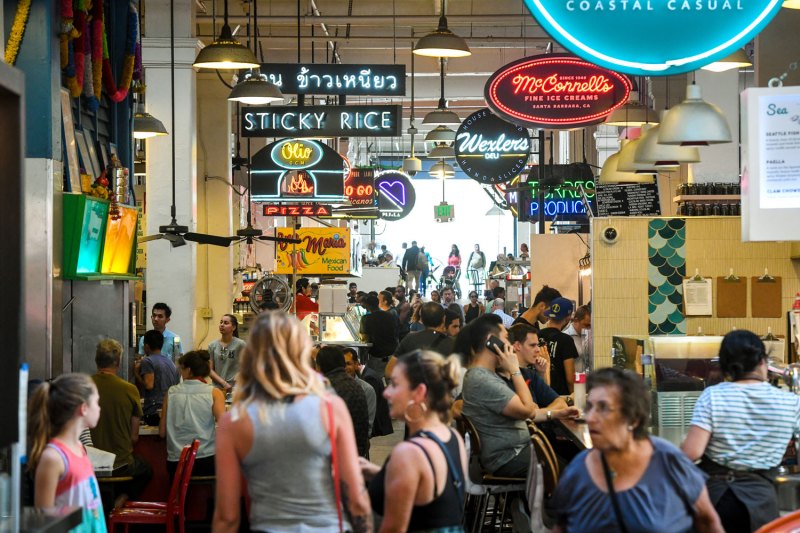
Since 1917, Grand Central Market in downtown Los Angeles has filled its historic 30,000-square-foot building with vendors and restaurant concepts selected to reflect LA’s multicultural population and the city’s desire for fresh, flavorful food. The market shops carry kitchen essentials like fresh-made pasta (Knead & Co.), dried chiles (Chiles Secos), artisanal breads (Clark Street Bread), and seasonal California produce (Torres Produce). As far as full-fledged prepared meals go, some of Grand Central’s premier vendors include the breakfast sandwich mavens at Eggslut, expertly fried chicken at Lucky Bird, flavorful and locally-sourced bento boxes at Bento Ya, and California classic McConnell’s Fine Ice Cream.
Shirokiya Japan Village Walk
Honolulu, Hawaii
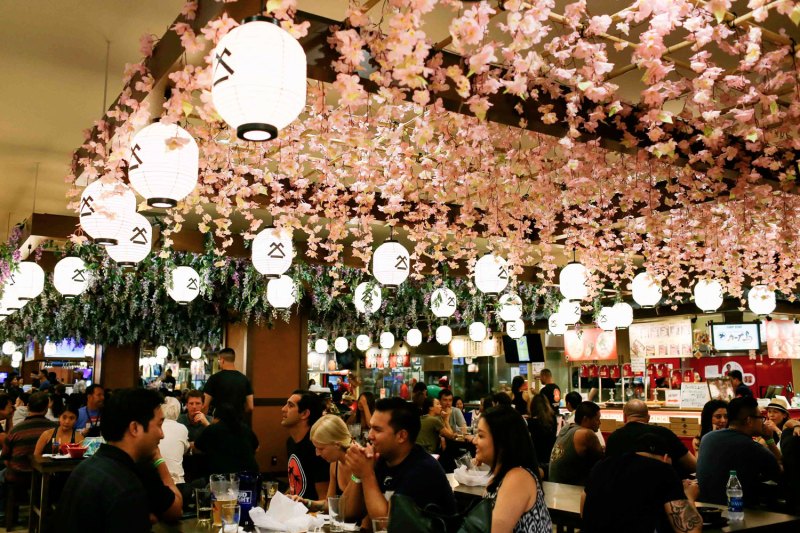
When it came to developing their first-ever food hall concept, the team behind Shiroyika Japan Village Walk in Honolulu looked to Japanese guardian shrines as sources of inspiration. They then translated those energies and aesthetics into a beautiful and interactive market experience with a spirit sanctuary, toy vendors, a stage for live music and theater, a beer garden, and a food market with over 40 grocers and restauranteurs serving up traditional Japanese dishes (like sushi, sashimi, ramen, and onigiri) made from Hawaiian produce and proteins.



